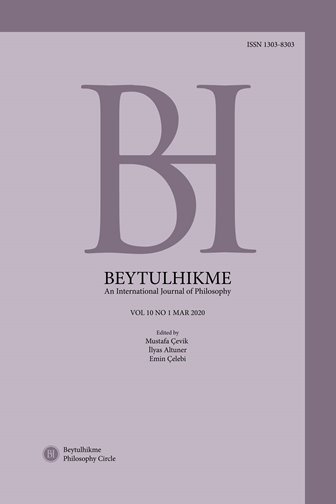Author :
Abstract
Bu yazının amacı, kolluk uygulamasının fenomenolojisini Husserl’in transandantal fenomenolojisi, Heidegger’in yorumsamacı fenomenolojisi, ve Merleau-Ponty’nin algı ideası üzerinden değerlendirmektir. “Kolluk uygulamasının gerçekliği nedir?” çalışmanın temel araştırma sorusudur. Fenomenoloji, zihin ve dünya arasındaki ilişkiyi göstererek deneyimin genel olarak anlaşılmasını sağlamaktadır. Kolluk uygulaması Husserl’ın fenomenolojisinde özneyle nesnenin ilişkisi olan transandantal bir eylem olarak yansımaktadır. Heidegger’in fenomenolojisi çoğunlukla “Dasein” kavramında görülmektedir ve bu da kolluğun zaman ve tarih bağlantısından etkilenmektedir. Merleau-Ponty’nin algı ideası, kolluk dünyasının kendisinin varolma düşüncesinin öncesinde varlığını devredilmez bir varlık olarak algılamaktadır. Husserl’dan farklı olarak Heidegger ve Merleau-Ponty varlığı kolluk organizasyonunun ve personelinin ayrılmaz parçası olarak görmektedirler.
Keywords
Abstract
This paper aims to develop the phenomenology of law enforcement praxis through a phenomenological interpretation of Husserl’s transcendental phenomenology; Heidegger’s hermeneutical phenomenology; and Merleau-Ponty’s idea of perception. The main research question of this research is “What is the reality of law enforcement praxis?” Phenomenology provides a general comprehension of the experience by demonstrating the relationship between the mind and the world. The praxis of law enforcement is reflected in Husserl’s phenomenology as a transcendental act by subject in relation to the object. Heidegger’s phenomenology mostly being in the concept of “Dasein”, which is influenced by a link with time and history of law enforcement. Merleau-Ponty’s idea of perception sees being existing prior to the thought of law enforcement as an ‘inalienable presence. Unlike Husserl; Heidegger and Merleau-Ponty perceive being as the inseparable part of the law enforcement organization itself and individual.
Keywords
- Carman, T. & Hanse, M. B. (Eds.) (2006). The Cambridge Companion to Merleau- Ponty. Cambridge: Cambridge University Press.
- Giorgi, A. (2012). The Descriptive Phenomenological Psychological Method. Journal of Phenomenological Psychology, 43 (1), 3-12.
- Heidegger, M. (1962). Being and Time. (Trans. J. Macquarrie & E. Robinson). New York: Harper.
- Heidegger, M. (1982). The Basic Problems of Phenomenology. (Trans. A. Hofstadter). Bloomington, IN: Indiana University Press.
- Heidegger, M. (1994). Basic Questions of Philosophy: Selected Problems of Logic. (Trans. R. Rojcewicz & A. Schuwer). Bloomington, IN: Indiana University Press.
- Howell, K. E (2004). Positivism, Phenomenology and Paradigms of Inquiry: Investiga- ting the Foundations of Methodological Approaches. British Academy of Management. Harrogate: University of Leeds.
- Howell, K. E. (2013). An Introduction to the Philosophy of Methodology. London: Sage Publications.
- Husserl, E. (1969). Ideas: General Introduction to Pure Phenomenology. (Trans. W. R. Boyce Gibson). London: George Allen & Unwin.
- Husserl, E. (1970). The Crisis of European Sciences and Transcendental Phenomenology: An Introduction to Phenomenological Philosophy. (Trans. D. Carr). Evanston, IL: Northwestern University Press.
- Husserl, E. (2003). An Introduction to Phenomenological Philosophy. (Trans. C. Welch). New Brunswick: Ateost Press.
- Laverty, S. M. (2003). Hermeneutic Phenomenology: A Comparison of Historical and Methodological Considerations. International Journal of Qualitative Methods, 2, 1-29.
- McIntyre, R. & Smith, D. W. (1989). Theory of Intentionality. Husserl's Phenome- nology: A Textbook. (Eds. J. N. Mohanty & W. R. McKenna). Washington, DC: Center for Advanced Research in Phenomenology and University Press of America, 147-179.
- Merlau-Ponty, M. (1962). Phenomenology of Perception. (Trans. C. Smith). London: Routledge & Kegan Paul.
- Merlau-Ponty, M. (1964). The Primary of Perception and Other Essays on Phenomenolo- gical Psychology, the Philosophy of Art, History and Politics. (Trans. W. Cobb). Evanston: Northwestern University Press.
- Moran, D. (2013). Edmund Husserl and Phenomenology. Philosophy of Minds: The Key Thinkers. (Ed. A. Bailey). London: Bloomsbury.
- Moustakas, C. (1994). Phenomenological Research Methods. California: Sage Publica- tions.
- Nenon, T. (2013). A Fundamental Difference: Husserl and Heidegger on the Grounding of Ethics. Investigaciones Fenomenologicas, 4 (2), 191-211.
- Waldenfels, B. (1999). Merlau-Ponty. A Companion to Continental Philosophy. (Eds. S. Critchley & W. R. Schroeder). Oxford: Basil Blackwell. Öz: Bu yazının amacı, kolluk uygulamasının fenomenolojisini Husserl’in transandantal fenomenolojisi, Heidegger’in yorumsamacı fenomenolojisi, ve Merleau-Ponty’nin algı ideası üzerinden değerlendirmektir. “Kolluk uygulamasının gerçekliği nedir?” çalışmanın temel araştırma sorusudur. Fenomenoloji, zihin ve dünya arasındaki ilişkiyi göstererek deneyimin genel olarak anlaşılmasını sağlamaktadır. Kolluk uygulaması Husserl’ın fenomenolojisinde özneyle nesnenin ilişkisi olan transandantal bir eylem olarak yansımaktadır. Heidegger’in fenomenolojisi çoğunlukla “Dasein” kavramında görülmektedir ve bu da kolluğun zaman ve tarih bağlantısından etkilenmektedir. Merleau-Ponty’nin algı ideası, kolluk dünyasının kendisinin varolma düşüncesinin öncesinde varlığını devredilmez bir varlık olarak algılamaktadır. Husserl’dan farklı olarak Heidegger ve Merleau-Ponty varlığı kolluk organizasyonunun ve personelinin ayrılmaz parçası olarak görmektedirler. Anahtar Kelimeler: Kolluk yönetimi, fenomenoloji, transandantal fenomenoloji, yorumsamacı fenomenoloji, algı ideası.





